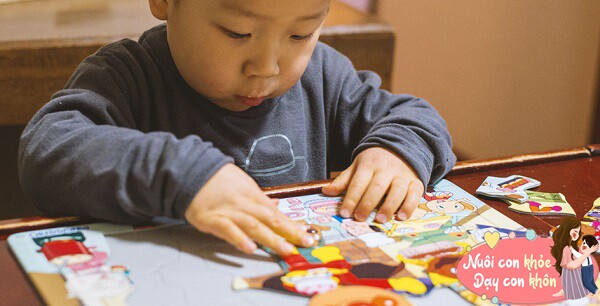Gifted children often exhibit four distinctive characteristics before and after entering elementary school.

Clear and concise speech
Many gifted children possess strong logical thinking skills, and they tend to speak clearly, concisely, and quickly. They have a rich vocabulary and advanced sentence structure even before starting elementary school.
For example, when asked by their parents about their day and if they had fun, a typical child might respond with: “The park. It was fun.”
A gifted child, on the other hand, might reply: “Today I went to the amusement park. I rode bikes with friend A on the path next to the sandpit. We had a lot of fun.”

They can converse clearly and coherently.
Language is integral to our daily lives, and classroom learning is also interpreted and understood through language. When speaking to these children, parents can enhance their comprehension and thinking skills by altering their phrasing.
Instead of saying: “Child, get mom a glass of water.”
Try: “Child, please get mom the yellow glass of water that we washed together this morning and place it on the dining table.”
If parents can construct longer sentences, they should do so, adding more details. Children raised in such a language-rich environment will naturally develop better expression skills.

Strong curiosity
Gifted children have a thirst for knowledge and understanding. They enjoy deep conversations and occasionally ask questions that even adults might not consider. This is because they possess keen insight and can easily grasp the essence of things.
These children also tend to have more knowledge and understanding than their peers. Sometimes, they are not satisfied with just children’s textbooks and picture books, preferring to delve into encyclopedias, history books, and other specialized texts. This can make them seem out of step with typical children, but it can also lead to the development of a talent.
Their curiosity and love of learning can become a driving force for achieving outstanding accomplishments. When encouraged and provided with the means to pursue their passions, gifted children will further showcase their extraordinary potential.

They possess a strong sense of curiosity.

Excellent memory
The higher a child’s IQ, the faster their thinking, and the better their understanding and analysis of the rules and patterns in things.
A child with an excellent memory and a quick learning ability is likely to be academically gifted. While some children need to hear or see something three or four times to remember it, a gifted child can often commit it to memory with just one exposure.
During lessons, while others are still scribbling notes, a gifted child has already internalized and grasped all the key points taught by the teacher.

They possess a remarkable memory.
Everything has a pattern, and success leaves clues. Gifted children often learn by following rules; for example, they might preview lessons before class, pay attention during lectures, and review afterward. They also tend to have clear goals, breaking down long-term objectives into smaller, manageable tasks.
Additionally, gifted children exhibit creativity and unique problem-solving abilities. They not only remember and apply knowledge effectively but also know how to flexibly combine their knowledge to find novel solutions.

High concentration
“I just listen in class and don’t do a lot of exercises, but I always come out on top in exams,” or “At home, I only do what I like and study what interests me.” These are common responses from gifted children when asked about their learning strategies.
Instead of merely following instructions, they focus on what truly captures their attention. This demonstrates their ability to effectively self-regulate their learning process.
Their concentration is like a spotlight, illuminating whatever captures their interest. This exceptional focus can be attributed to two factors.

They possess a high level of concentration.
Firstly, it may be due to their natural “endowment” of concentration and attention. They could be born with more efficient brains, enabling them to focus intensely on their interests.
Secondly, their home environment and parental encouragement play a significant role. When parents provide opportunities and support for their children to focus on their passions, they cultivate a habit and skill that allows them to become deeply engrossed in and quickly master their chosen pursuits.

































